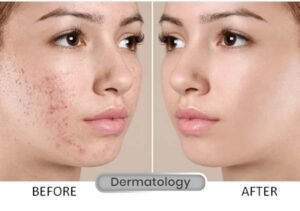Dr. Parvez Skin and Hair Clinic
 Dermatological conditions can manifest in various ways, including:Seeking guidance from a dermatologist is crucial for accurate diagnosis and personalized treatment plans tailored to individual needs. Regular skin screenings and proactive skincare practices can help prevent and manage dermatological conditions effectively.
Dermatological conditions can manifest in various ways, including:Seeking guidance from a dermatologist is crucial for accurate diagnosis and personalized treatment plans tailored to individual needs. Regular skin screenings and proactive skincare practices can help prevent and manage dermatological conditions effectively.
Dermatological conditions can manifest in various ways, including:
Skin Rashes: Redness, itching, and inflammation on the skin.
Lesions or Bumps: Raised or discolored patches, nodules, or growths on the skin.
Pain or Discomfort: Sensations of pain, burning, or discomfort associated with skin issues.
Changes in Skin Texture: Rough, scaly, or dry patches of skin.
Hair Loss: Thinning or loss of hair on the scalp or body.
Nail Abnormalities: Changes in nail color, shape, or texture.
Dermatological conditions can have various causes, including:
Genetics: Some conditions, such as psoriasis or eczema, have a genetic predisposition.
Environmental Factors: Allergens, irritants, sun exposure, and pollutants can trigger or exacerbate skin conditions.
Infections: Bacterial, viral, or fungal infections can lead to skin issues like acne, warts, or athlete’s foot.
Autoimmune Disorders: Conditions like lupus or scleroderma involve the immune system attacking healthy skin cells.
Hormonal Changes: Fluctuations in hormone levels can contribute to conditions like acne or hair loss.
Treatment for dermatological conditions depends on the specific diagnosis but may include:
Topical Medications: Creams, ointments, or lotions containing steroids, antibiotics, or antifungal agents.
Oral Medications: Prescription medications such as antibiotics, antihistamines, or retinoids.
Phototherapy: Controlled exposure to ultraviolet light to treat conditions like psoriasis or vitiligo.
Surgical Procedures: Excision, laser therapy, or cryotherapy to remove lesions, scars, or unwanted hair.
Lifestyle Changes: Avoiding triggers, maintaining proper skincare routines, and managing stress to improve overall skin health.
Seeking guidance from a dermatologist is crucial for accurate diagnosis and personalized treatment plans tailored to individual needs. Regular skin screenings and proactive skincare practices can help prevent and manage dermatological conditions effectively.
 Call Now Button
Call Now Button